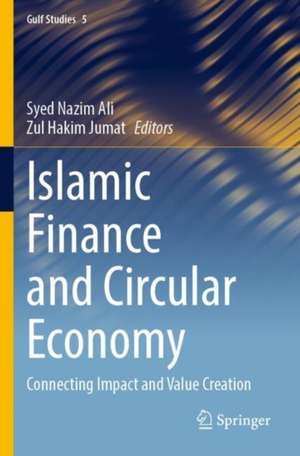Islamic Finance and Circular Economy: Connecting Impact and Value Creation: Gulf Studies, cartea 5
Editat de Syed Nazim Ali, Zul Hakim Jumaten Limba Engleză Paperback – 6 dec 2022
| Toate formatele și edițiile | Preț | Express |
|---|---|---|
| Paperback (1) | 1110.24 lei 6-8 săpt. | |
| Springer Nature Singapore – 6 dec 2022 | 1110.24 lei 6-8 săpt. | |
| Hardback (1) | 1116.40 lei 6-8 săpt. | |
| Springer Nature Singapore – 5 dec 2021 | 1116.40 lei 6-8 săpt. |
Preț: 1110.24 lei
Preț vechi: 1353.95 lei
-18% Nou
Puncte Express: 1665
Preț estimativ în valută:
212.45€ • 227.18$ • 177.13£
212.45€ • 227.18$ • 177.13£
Carte tipărită la comandă
Livrare economică 17 aprilie-01 mai
Preluare comenzi: 021 569.72.76
Specificații
ISBN-13: 9789811660634
ISBN-10: 9811660638
Pagini: 335
Ilustrații: XII, 335 p. 39 illus., 31 illus. in color.
Dimensiuni: 155 x 235 mm
Greutate: 0.49 kg
Ediția:1st ed. 2021
Editura: Springer Nature Singapore
Colecția Springer
Seria Gulf Studies
Locul publicării:Singapore, Singapore
ISBN-10: 9811660638
Pagini: 335
Ilustrații: XII, 335 p. 39 illus., 31 illus. in color.
Dimensiuni: 155 x 235 mm
Greutate: 0.49 kg
Ediția:1st ed. 2021
Editura: Springer Nature Singapore
Colecția Springer
Seria Gulf Studies
Locul publicării:Singapore, Singapore
Cuprins
Chapter 1. Islamic Finance and Circular Economy: An Introduction.- Part 1: Islamic Perspective on Circular Economy and Sustainability.- Chapter 2. Islamic Perspective on Circular Economy.- Chapter 3. Environmental Protection and Sustainable Development: An Islamic Perspective.- Part 2: Convergence of Islamic Finance and Circular Economy.- Chapter 4. Circular Economy Financing: An Islamic Finance Perspective.- Chapter 5. Circular Economy, Green Economy, and Sustainable Development: Establishing The Interconnections and Discoursing The Role of Islamic Finance.- Chapter 6. The Circular Economy and Its Possible Collaboration with Islamic Economics and Finance.- Chapter 7. ESG Analysis and Shariah Screening: Mutual Learnings For A Better Investment Climate.- Chapter 8. Sustainable Investment and Transparency Recommendations in Segmented Markets: An Application to Islamic Investment Accounts.- Chapter 9. Sustainability, Trust and Blockchain Applications in Islamic Finance and Circular Economy: Best Practices and Fintech Prospects.- Chapter 10. Financial Development and Ecological Footprint in OIC Countries: Islamic Perspectives and Empirical Evidence.- Chapter 11. A Consumer Perspective of The Circular Economy: An Empirical Investigation Through Structural Equation Modelling.- Chapter 12. A Multi-Layer Analysis and Solution For Climate Crisis: From The Restructuring of Production to Restructuring of Knowledge.- Part 3: Circular Economy Innovations – Case Studies.- Chapter 13. Zero Waste Cities in The Developing World: A Comparative Study.- Chapter 14. Solving The Problem of Water, Sanitation And Hygiene in Nigeria Using Blended Finance.- Chapter 15. The Role of Islamic Finance in Fostering Circular Business Investments in The Case Of Qatar’s Tire Industry.- Chapter 16. Electronic and Electrical Waste Management: Malaysia and Sweden Experiences.
Notă biografică
Syed Nazim Ali is a Research Professor and the Director for the Research Division and the Center for Islamic Economics and Finance, College of Islamic Studies, at the Hamad Bin Khalifa University, Qatar Foundation. He has spent the last thirty years spearheading research in Islamic Finance and faith-based initiates in Finance. He was Founding Director of the Islamic Finance Project (IFP) at Harvard Law School, Harvard University, since 1995. He has paid special attention to lines of inquiry that seek to examine and interrogate the frontiers, facilitate research and encourage dialogue among various stakeholders and external discussants. He has played a lead role in organizing several conferences and seminars, creating forums for highly intellectual debates on global trends. He has published many books, including Takaful and Islamic Cooperative Finance: Challenges and Opportunities (2016); and Shari‘a-Complaint Microfinance (2012).
Zul Hakim Jumat is a researcher for the Center of Islamic Economics and Finance (CIEF), College of Islamic Studies, Hamad Bin Khalifa University (HBKU), Qatar Foundation. He has been a part of several organizing committees for Islamic Finance conferences and seminars, providing an intellectual platform for industry leaders and academia to discuss global emerging trends and issues. Before joining CIEF, he was a research editor at Dow Jones Risk & Compliance team, focusing on Sanction Ownership Research. He holds an MSc in Islamic Finance (2018) from HBKU, majoring in Islamic Corporate Finance and Asset Management, and a BSc (Hons) in Islamic Jurisprudence and Principles of Jurisprudence (2015) from Kuwait University, minoring in Economics. Currently, he is a Ph.D. candidate in Islamic Economics and Finance at HBKU.
Zul Hakim Jumat is a researcher for the Center of Islamic Economics and Finance (CIEF), College of Islamic Studies, Hamad Bin Khalifa University (HBKU), Qatar Foundation. He has been a part of several organizing committees for Islamic Finance conferences and seminars, providing an intellectual platform for industry leaders and academia to discuss global emerging trends and issues. Before joining CIEF, he was a research editor at Dow Jones Risk & Compliance team, focusing on Sanction Ownership Research. He holds an MSc in Islamic Finance (2018) from HBKU, majoring in Islamic Corporate Finance and Asset Management, and a BSc (Hons) in Islamic Jurisprudence and Principles of Jurisprudence (2015) from Kuwait University, minoring in Economics. Currently, he is a Ph.D. candidate in Islamic Economics and Finance at HBKU.
Textul de pe ultima copertă
This book is the first of its kind to provide a critical overview and theoretical analysis of the Circular Economy from Shariah and Islamic Finance perspectives. The book is divided into three parts. The contributing authors pay close attention to Islamic Finance in light of sustainability and value creation. It also includes case studies on the Circular Economy application in Islamic Finance industry. The book is of interest to academics, students, and practitioners on Islamic Economics and Finance who have an interest in understanding the Circular Economy under the lens of Islamic Finance principles and applications.
Caracteristici
Examines the concept of a circular economy from an Islamic perspective Brings together work from leading researchers in academia and industry Highlights the holistic convergence of SDGs, Circular Economy, Islamic Economics and Maqasid al-Shariah















